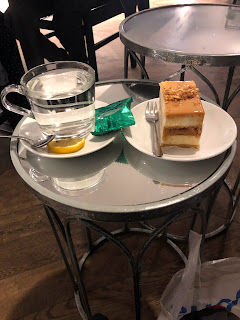Full disclosure: for years I've thought the Men's Schola was singing "Fool in the Panting Heart of Rome" back in the halcyon days when Benedict XVI was gloriously reigning. Only now do I discover they were attempting to pronounce "Full." That's what happens when you don't give the mere congregation the lyrics.
It has been a very Toronto week, notwithstanding my 8-hour-a-day work schedule--save for Monday, whose afternoon I long ago arranged to have off, knowing that jet lag would strike around 12. Instead of working, I telephoned my Canadian goddaughter's mother, and the latter came to get me in her automobile. We traversed the highways and byways of northernmost Toronto; I seem to recall these once having been thinner and racing past fields, not vast expanses of ugliness. We then went through neighbourhoods I've never seen before--there are Polish cities I know better than those parts of Toronto--and we never stopped talking.
Still, there was a very homey, very Canadian sight in one cul-de-sac: two tall boys on rollerblades playing road hockey, using a bona fide net. And even better, they were my friends' sons, three years older then when I saw them last. The eldest gave me a hearty squeeze. Inside the house there were more children, one of them the very pretty little girl who is my goddaughter. Naturally she did not remember me, but we soon became good friends.
Tuesday I managed to sleep until 6 AM and had a good day's work. What I did in the afternoon completely escapes my mind, but I am certain it involved eating cookies. The Advent fast is nigh impossible at my parents' house, for my mother bakes dozen after dozen of traditional biscuits, and every one tastes like Christmas.
Wednesday I got the message that a prominent local activist I knew very slightly at 18 had died, and that someone should write about this. Reading the obituary, I realized that not only should she be eulogized, someone should represent work at her funeral. Consultations led to the realization that the most senior person in Toronto that day was me, and so it was that one of my oldest friends came by in his car, and whisked me off through more neighbourhoods about which I know nothing to a church I haven't been in for 20+ years.
I saw many people I know, of all ages, two of them nationally famous, one of them internationally so. I exchanged greetings with a woman I first met when I was 18 and her husband (ditto) and her mother (ditto). I exchanged greetings with a man I might not have spoken to since I was 19. And I must say, that was a very full church for a woman who had been 97 and never blessed with children.
To the cemetery we went, my old pal--my actual prom date, come to think of it--now driving me through streets both familiar and unfamiliar, and once again the conversation was freely flowing. And then after the interment, the drive home. I bowed out of the funeral tea (to be precise, a late lunch at Red Lobster) to return home to work.
After work, I went downtown to dine with my Toronto brother. This time I took public transit, and this too was a mix of familiar and unfamiliar: although the routes are the same, the elements have changed slightly. There was a new place on the bus to put my transit card--and the machine depressingly informed me how much money was left on it. The subway train--which for some years now has been one long snakelike compartment-- rang with the shouts of a mentally ill man. The northeast corner of Dundas and Yonge Streets looked onto a neon and jumbotron scene from Bladerunner and stank of now totally legal marijuana. The streetcar along Dundas Street West was dotted with people who wore masks and people who did not. The restaurant was dark, chic, tasty, and expensive. Oh, what it is to be a grown-up with a real job and to eat in the kind of restaurants I barely dared look at as a student.
My brother, happily, was materially the same. He is still into vegetables and initially ordered all the vegetable dishes on the menu (plus lamb chops and haute cuisine lasagna), but the waiter thought that would be too much.
Afterwards my brother generously drove me home--the streets were all familiar even in the darkness--so once again I had the enormous treat of seeing Toronto by car. (When you're a non-driver married to a non-driver, car rides are as exciting as magic carpets and much more comfortable, I imagine.)
On Thursday I went to my goddaughter's house for supper. Her dad was summoned to pick me up from the nearest subway station. He pointed out that I could have waited for him from the nearest bus stop instead, but I said that for all I knew that intersection is patrolled by drug dealers. A fair main, he allowed this to be so.
Anyway, once again I was met by some truly delightful children, and I had the great privilege of discovering that I was seen in the light of a gigantic huggable teddy bear by my goddaughter. She and a toddler both managed to sit on my lap, which was very cozy. There was dinner--the adults got their very own table for maybe as much as 10 minutes--and then family prayers, in which I felt greatly privileged to take part. My goddaughter and her siblings went off to bed, and I had a good long chat with her mother until her father drove me all the way home. So I had yet another magic carpet ride through the sprawling metropolis.
Friday's exciting excursion was a 45 minute walk in the cold through very familiar ways to a new hairdresser to put my hair in some order. It was very reassuring to see that every woman in the joint, clients and staff, had curly hair. I emerged de-frizzed and went home to eat supper.
This morning I walked for an hour--it was bitterly cold--to visit my sister and then we went to the local mall, she to have her nails done and I to have lunch with another old pal. Then I had my nails done myself (although less ornately) and walked home.
Tomorrow I go by train to Montreal.











